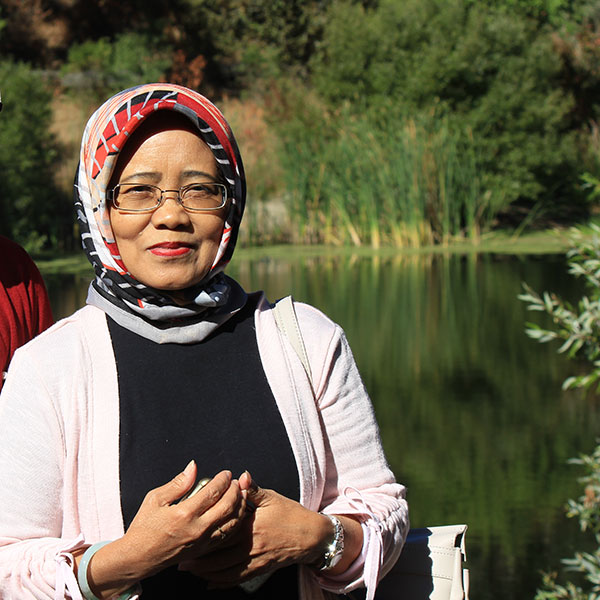
The Carbon Institute Story
Our mission is to tackle climate change by training leaders around the world to conserve and restore ecosystems. The Carbon Institute partners with governments, universities, foundations, and educational networks to implement nature-based solutions to climate change. We believe a strong global climate workforce is essential to building a stable, just, resilient, and prosperous future.
The Carbon Institute flips the traditional nonprofit organization on its head. Our governing board of directors and council is as diverse as our partnership.
As a partner-driven collaboration, we believe a strong global climate workforce is essential to building a stable, just, resilient, and prosperous future. We place human rights, gender equality, local and traditional knowledge, and environmental justice at the center of our work.
The Carbon Institute has made significant contributions to sustainable capacity development in terrestrial carbon accounting in developing countries. With its unique approach and working modalities between partners, it has a huge opportunity to expand its existing partnerships in terms of both its regional coverage and its scope of training, especially after the adoption of the Paris Agreement Rulebook, which recognizes the central role of capacity building for the transparency framework. — Nur Masripatin, Carbon Institute Council Chairwoman and Senior Advisor, Indonesian Ministry of Environment and Forestry. 2019.

A Global Partnership
We are a radically transparent, polycentric team of scientists, policy experts, and members of government.
Learn More >
A Policy Innovator
We work collaboratively to help shape global climate change policies to bring oceans and forests to the negotiation table.
Learn More >
Building Human Capacity
We have trained 47 faculty members in six countries and 250 experts, totaling 15,000 course hours in measuring and restoring ecosystem carbon stocks.
Learn More >
A Global Movement
We build bridges to collaboratively find the best strategies to restore ecosystems and achieve long-term climate resilience.
Learn More >
Beginning with The Tropical Forest Group
Our story begins in 2006, as the Tropical Forest Group (TFG)—a group of foresters, activists, and policy wonks based in Santa Barbara, California. TFG ran high-impact education and advocacy campaigns at the UNFCCC Conference of the Parties meetings to increase tropical forest conservation finance. Under the Tropical Forest Group, we:
- Provided direct support to community forestry projects
- Organized strategic research and consulting on tropical forest policy, scientific methodologies, sustainable finance, and project development
- Assisted local partners with ecosystem carbon modeling, measurements, and analysis
The World’s First Advanced Carbon Accounting Certificate
In 2013, the Tropical Forest Group partnered with the World Wildlife Fund US and University of California San Diego Extension to design and run the first university accredited certificate course in advanced terrestrial carbon accounting. This certificate was taught by global leaders in climate policy, remote sensing, field forestry measurements, and statistics in an intensive, hands-on, four-week course. Demand for the certificate was high with more than 150 qualified applicants applying for a limited number of course openings.
The course was inspired by the fact that land use, land use change, and forestry (LULUCF) cause 23 percent of global greenhouse gas emissions. To reduce emissions from land use, countries need to have internal capacity to measure and monitor their ecosystem carbon stocks. High resolution data on LULUCF emissions is essential for influencing national policies, mobilizing international finance, and developing effective strategies. However, as shown by the 2013 course, the need for carbon accounting information far outpaces the strength of the professionally-trained and certified workforce.
The Widening Gap
As COP21 in 2015 concluded with the monumental achievement of the Paris Agreement, the gap between experts needed and experts trained increased even more. The political will for tackling climate change had never been higher. However, there was still a significant disconnect between pledged countries made in their nationally determined contributions (NDCs) and their abilities to transparently measure and report their emissions. Building on the success of the University of California San Diego certificate and the growing global need for carbon accounting capacity, we brought the course to the countries that could benefit from it the most: China—the world’s largest emitter—and Indonesia— the largest emitter from land use change at the time.
Going Global Where It Counts
In 2016, the Tropical Forest Group teamed up with the Greenhouse Gas Management Institute (GHGMI), Forest Carbon Accounting and Monitoring Center (FCAMC), and Centre for Climate Risk and Opportunity Management (CCROM) to develop and run advanced terrestrial carbon accounting courses at universities in China and Indonesia. The German Federal Ministry for Environment, Nature Conservation, and Nuclear Safety (BMU) funded a €2.0 million, four-year grant to launch this partnership as the Carbon Institute.
Scaling the Model: Central African Regional Hub
In 2017, the Carbon Institute co-developed replicable terrestrial carbon accounting certificates with faculty in Cameroon, Republic of the Congo, and Democratic Republic of the Congo, all supported by the United States Forest Service International Programs.
After mentoring the best academics in Cameroon with prior expertise in forestry and terrestrial carbon accounting, these Cameroonian teachers then taught the curriculum to faculty in the Republic of the Congo. The best faculty from these two countries then teamed up to teach the course in the Democratic Republic of the Congo. The result: three successful advanced terrestrial carbon accounting certificates in Central African countries, all taught by faculty in the region.
In 2019, all the Carbon Institute faculty and staff from every country decided to raise our own ambition and make our work permanent. Our international council voted unanimously to incorporate as an independent 501(c)(3) nonprofit organization governed by the partnership. We are entering a new chapter with a bold vision for what we plan to accomplish.

